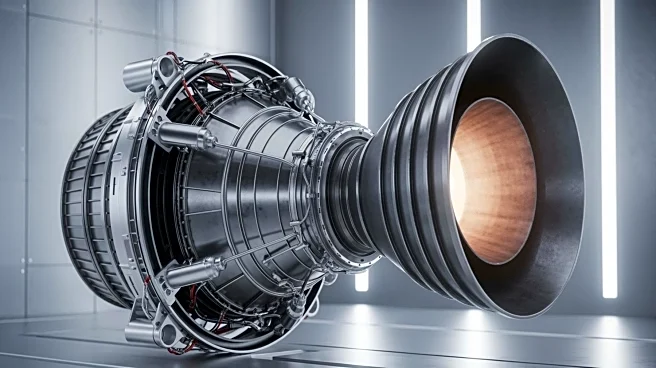What's Happening?
Relativity Space has made significant progress in the development of its Terran R rocket, with the completion of the thrust section and ongoing testing at its Long Beach, California facility. The thrust section,
a critical component of the rocket, was completed in August 2025 and has undergone extensive testing to simulate flight conditions and ensure structural integrity. The testing included simulating maximum dynamic pressure and static fire pressures, with the thrust structure successfully withstanding 3.7 million pound-force of tension. The company is also advancing other components, including the first stage's structural barrels and Aeon R flight engines, as it prepares for the rocket's first flight scheduled for late next year.
Why It's Important?
The development of the Terran R rocket by Relativity Space represents a significant advancement in the competitive landscape of space launch providers. As the company moves towards its first launch, it aims to offer a partially reusable vehicle capable of competing with established players like SpaceX's Falcon 9. The successful testing and integration of the thrust section and other components are crucial steps in ensuring the reliability and performance of the Terran R. This progress not only enhances Relativity Space's position in the market but also contributes to the broader trend of increasing competition and innovation in the space industry, potentially leading to more cost-effective and sustainable launch solutions.
What's Next?
Relativity Space is focused on completing the integration of the thrust structure onto the flight vehicle, along with the addition of brackets, fluids, and avionics. The company is also constructing the thrust structure for Terran R's second flight and advancing critical avionics components. With the first flight scheduled for the second half of 2026, Relativity Space is working on finalizing the launch pad improvements at Cape Canaveral Space Force Station, including the construction of a large processing hangar and installation of liquid oxygen tanks. As the company continues to develop and test components, it aims to support increased flight rates and advanced mass production capabilities.
Beyond the Headlines
The development of the Terran R rocket by Relativity Space highlights the growing trend towards reusable launch vehicles, which are seen as key to reducing costs and increasing the sustainability of space exploration. The use of advanced materials and manufacturing techniques, such as 3D printing, in the construction of the Terran R reflects the industry's shift towards more efficient production methods. Additionally, the focus on densified propellants and advanced avionics systems underscores the technological innovations driving the next generation of space vehicles. As Relativity Space progresses towards its first launch, the implications for the space industry include increased competition, technological advancements, and potential shifts in market dynamics.










